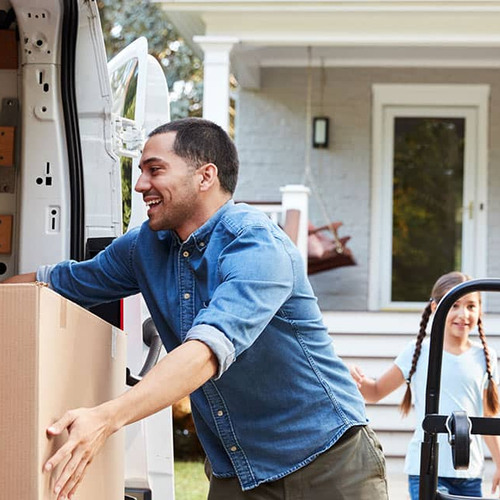Moving costs: How much will it cost you to move?
Contributed by Sarah Henseler
Jan 5, 2026
•7-minute read

No surprise, but moving can cost a pretty penny. According to Angie's List, the average moving cost within a 100-mile radius has a price tag of $1,708, and ranges between $881 and $2,464.
Moving costs usually are a cluster of various fees and expenses that can rack up quickly. Your moving checklist – which can include everything from labor, truck rentals, packing materials, movers, cleaning services, time taken off from work – can be costly.
Key takeaways:
- The cost of your move hinges heavily on how far you’re moving, whether you hire help, and how large your home is.
- Due to economic pressures, labor, packaging materials, and fuel are rising, which can impact your final moving budget.
- It's key to get and compare quotes when determining movers, storage companies, and other services, so that you stick within budget.
Factors in moving costs
So how much is moving? Here's the thing: Moving can include hidden costs that might not have even crossed your mind. Here, we'll walk you through all the different expenses that go into uprooting from your home:
Labor
Labor costs can be anywhere from $882 to $2,564 for a local move. This can vary depending on where you live, how far you're moving, the size of your home, and if you need help with packing or disassembling furniture.
Distance you need to travel
As you might expect, how far you're moving can influence the price tag of your move. The average cost of movers for long distance, which is 100 miles or more, currently hovers at $2,700 to $10,000 and upward. Movers and trucks rental companies typically charge for their services on either an hourly basis or "per mile" fuel charges.
Size of the home
The larger your home and the number of your belongings, the more costly your move. On the flip side, the smaller your home, the less pricey. For example, the cost of movers for a one-bedroom home can be anywhere from $250 to $700, while the price tag for a three-bedroom home ranges from $900 to $2,000.
To approximate your moving cost, assess your space and how much stuff you have. You'll also want to factor in how much disassembling and packing the movers will need to tend to.
Moving truck rental fees
The average cost of renting a truck costs $200 for a local move for a two bedroom. A long-distance move for a five-bedroom home, however, hovers at $3,000 on average. Even if you're going the DIY route to save on costs, you'll also need to factor in fuel costs, taxes, and insurance premiums.
The larger the truck, the more expensive. It's a good idea to try to figure out what size truck you realistically need. And, if you can reasonably handle moving on your own. If you have friends and family who are willing to lend a helping hand, that might make it a more feasible option.
Maybe you have a lot of fragile artwork or delicate, rare family heirlooms that require special handling and care. Or, you and your partner live busy lives, and don't have time to carve out to pack and unpack your housewares, furniture, clothing, and sundry items.
Packing and unpacking services
If you decide to hire professional packing and unpacking services, usually packaging materials and the handling of high-value and priceless objects will add to the total cost.
While the cost can vary, expect to pay between $280 and $2,200. Unpacking services can tack on an extra $100 to $400. When it comes to labor, you're looking at $25 to $40 an hour per packer. Packing materials include boxes, bubble wrap, tape, and packing blankets. You might spend anywhere from $180 for a one-bedroom property, and up to $750 for a five-bedroom place.
Storage unit and pod fees
Renting out a storage unit can safely keep excess stuff that you don't have space in your new digs. Maybe there are items you value and aren't ready to part with.
Storage units can range from $70 to $300 a month, depending on the size, type, and what's available. As the price can depend on the competition and inventory, it's a good idea to do your research and get a moving estimate from a few different storage unit facilities.
If you're curious about pods, which are storage units that are delivered to your home, and their contents can be sent to your new home or stored at a facility, the cost can vary. Factors that affect the cost include the location, the time of year and time frame, and the size and number of containers needed. Storage fees start at $149 a month, and delivery and pick-up fees average $75.
Packing materials
If you want to go the DIY route on packing your belongings yourself, you might need:
- Cardboard boxes in various sizes
- Dish-packing boxes
- Bubble wrap
- Packing peanuts or paper
- Mattress covers
- Moving blankets
- Packing tape
- Labels
Some of these items can be rented – think moving blankets and handtrucks.
Why does moving cost so much?
There's many reasons moving can come with a high price tag. For one, shifts in the moving industry affect the high-level overview of the moving industry and what’s contributing to rising costs. Everything from trailers and insurance to fuel surcharges, to labor costs, has gone up in cost as much as 80%.
Key costs that can be passed on to consumers include:
- Fluctuating fuel costs
- Trailer leases
- Rising labor costs
- Increasing costs of packaging materials
Tips for saving on moving costs
To not get blindsided by the high cost of moving, you'll want to look for common pitfalls, such as scheduling buffer time or looking carefully at contracts. Also, it's a good idea to be mindful of how to save on moving costs. Here are some ways you can shave off some dollars:
- Move midweek or during off-peak season. Moving during busy moving seasons, such as the spring and summer months; and on the weekends will cost you more than if you move during the middle of the week or off-season. Research local movers and get quotes to see what the difference in cost might be.
- Declutter or downsize before moving. The less stuff you need to pack and transport, the less expensive it will be. Plus, you might be able to get a tax deduction on items you donate during your purge. You can also make extra money on things you sell online or at a yard sale.
- Pack yourself. While this can save you money, you'll want to bear in mind the costs of packing materials and how much time it'll take to go the DIY route.
- Use free or low-cost packing supplies. You can look by dumpsters of grocery stores for boxes, or ask your local Buy Nothing group for sturdy boxes or packing supplies.
- Negotiate or get multiple quotes. Whether it's movers, truck rentals, or professional packing service cost, get quotes. Do so early so you have time to gather information from at least several companies. It can save you a significant amount of money.
- Be flexible about moving dates. If you have some wiggle room on the closing date of the sale of your home and the time frame of when you're moving, take advantage of moving during a slower season, when costs will be less expensive overall.
- Avoid hidden surcharges. Fuel surcharges, additional costs to use the stairs, and long carries can make moving cost way more than you anticipated. To steer clear of this, get a detailed quote, and ask questions on charges you're not clear about.
- Combine moving and storage services. Exploring options like pods and services that combine moving and storage can help you save a few bucks.
FAQ about moving costs
Here are some frequently asked questions about the cost of moving:
Is hiring movers worth it?
Hiring movers can be worth the cost if you have a lot to pack, have a complicated situation, or fragile, valuable items. It can also be worth it if you’re pressed for time. If you're relocating for work, your new employer might cover some of the fees.
How do movers charge (hourly rate vs. flat rate vs. by weight)?
Movers can charge in a number of ways: hourly, flat rate, or by distance and weight. They might charge by mile. It's a good idea to get an estimate and know the method by how they charge to help you assess which is the best, more affordable option for you.
Should I get moving insurance through my moving company?
Moving companies are required to provide a base compensation of $0.60 per pound for a damaged item, but you might desire more coverage should your coveted belongings get lost or damaged during a move. You'll want to assess the risk with the extra costs to see if it's a good choice for you.
Do I pay for travel time?
Moving companies can charge for travel time. This is usually folded into their hourly rate or a flat fee. In some cases, the moving company can charge a "double drive" time fee. Double drive is the rate of the driving time between point A to point B during a move, times two. So let's say the driving distance is 5 miles. In that case, the movers will charge the rate for a 10-mile move. That way, the company assures the movers are compensated fairly for their services, and factors in all the costs involved.
Are moving costs tax deductible?
In most cases, moving expenses are no longer tax deductible on your federal returns. However, if you currently serve as an active military member, you might be able to claim moving deductions on your taxes.
The bottom line: Preparation is key in reducing moving costs
With moving costs being as high as they are, doing your research is important to keeping your moving costs to a minimum.
Affordable moving is a mix of preparation, timing, and keeping practical and logistical matters top of mind. If you're wondering whether you should buy or rent your next home, consider using the Rocket Mortgage rent versus buy calculator. If you decide you’re ready to buy a home, get in touch with one of our Home Loan Experts to go over your mortgage options.

Jackie Lam
Jackie Lam is a seasoned freelance writer who writes about personal finance, money and relationships, renewable energy and small business. She is also an AFC® financial coach and educator who helps creative freelancers and artists overcome mental blocks and develop a healthy relationship with their finances. You can find Jackie in water aerobics class, biking, drumming and organizing her massive sticker collection.
Related resources

4-minute read
Low-income moving assistance programs
There are many moving assistance programs and resources available to those who need extra help affording moving expenses. Explore your options here.
Read more

3-minute read
When to rent vs. buy a house: Weighing the pros and cons
When relocating to a new place for a job, you have a choice between renting or buying a home. Explore the pros and cons of each approach before deciding.
Read more
8-minute read
How to move out of your parents’ house in 18 steps
Ready to move out of your parents’ house, but not sure how? Follow our guide for tips on how you can become a financially responsible first-time homeow...
Read more